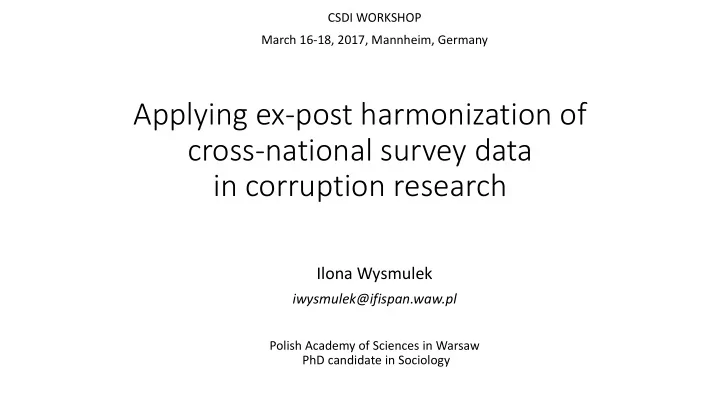

CSDI WORKSHOP March 16-18, 2017, Mannheim, Germany Applying ex-post harmonization of cross-national survey data in corruption research Ilona Wysmulek iwysmulek@ifispan.waw.pl Polish Academy of Sciences in Warsaw PhD candidate in Sociology
Context - Growing numer of cross-national public opinion surveys available - “… self-reports from surveys will continue to provide the basis for most research on and assessment of corruption in the future ” (Nona Karalashvili et al. 2015) - Leading role in corruption research: Transparency International - Global Corruption Barometer The World Bank - World Bank Enterprise Survey - Aim: a systematic review of questionnaires and codebooks of international public opinion surveys in search for questions on corruption
Criteria of selecting survey projects - at least one question on corruption - designed as cross-national - representative samples - freely available in public domain - with documentation in English - cover European countries [1989 – 2013]
In search for data and documentation... • Data Harmonization Project [SDR dataset @ DATAVERSE] • Consortium for Political and Social Research (ICPSR) • GESIS Data Archive for the Social Sciences • ROPER Public Opinion Research Archive + Literature review + Academic consultations
Cross-national surveys: growing interest in corruption
Concept categorization of non specialized surveys (additionally to specialized issues of GCB, EB, ICVS i LiTS) Questions on Questions specifically about bribes or using connections corruption (generally) Bribe Connections How widespread do you think Can accepting/paying a bribe be How important is using corruption is in the public justified? connections (to get a good service/among politicians? job)? WVS/1994, ASES/2000, WVS/1989, EVS/1990, ISJP/1991, ISJP/1996, CDCEE/2000, CSES/2001, NBB/2001, WVS/1994, EVS/1999, CB/2009, ISSP/2009, ISSP/2004, NBB/2004, ISSP/2006, WVS/1999, WVS/2005, CB/2010, CB/2011, CB/2012 QoG/2010, QoG/2013 EVS/2008, CB/2011 How well (nation/EU/CEE countries) In the past 12 months have you or How often 'having the right government is dealing with corruption? anyone living in your household connections' - a reason why paid a bribe in any form? there are rich people? ASES/2000, EB/2002 58.1, EB/2011 NBB/2000, CB/2010, QoG/2010, ISJP/1991, ISJP/1996 75.1, CB/2011, CB/2012, QoG/2013 How big a problem of 'corrupt political Should a bribe be offered to get Should use connections to get leaders' is in our country? gov. permit/solve problem at gov. gov. permit/solve problem at office? gov. office? PEW/2002, PEW/2007, PEW/2009 VPCPCE/1993, NBB/2000, NBB/2000, NBB/2001 NBB/2001
Cross-national datafile and documentation with corruption items available @ Harvard Dataverse
Corruption Experience in Public Schools • ‚ Petty ’ corruption experience giving unofficial payment, gift or bribe to a public official in a local public school • Roots in crime victimization surveys • Main research hypothesis: individuals position in the socioeconomic structure determines chances of becoming a criminal or a victim in this case: likelihood of corruption experience
Corruption data: harmonized ex-post • 3 survey projects: (1) Global Corruption Barometer, (2) Life in Transition Survey and (3) Quality of Government survey • 71 national surveys • 31 578 respondents
Harmonized variables in corruption dataset Variable Label Value Labels Mean SD Min Max Corruption experience in education 1 = gave bribe / unoff. payment 0.06 0.24 0.00 1.00 0 = no/DK Corruption perception in education 1 = corruption is prevalent 0.23 0.42 0.00 1.00 0 = other Gender of respondent 1 = female 0.58 0.49 0.00 1.00 0 = male Place of residence 1 = rural 0.35 0.48 0.00 1.00 0 = other Respondent’s age 18 - 29 years 0.26 0.44 0.00 1.00 30 - 49 years 0.50 0.50 0.00 1.00 50 years and older 0.24 0.42 0.00 1.00 Respondent’s education Primary or less 0.23 0.42 0.00 1.00 Secondary 0.51 0.50 0.00 1.00 Tertiary 0.26 0.44 0.00 1.00 Survey project GCB_2010 0.36 0.48 0.00 1.00 LITS_2010 0.23 0.42 0.00 1.00 QoG_2010 0.41 0.49 0.00 1.00
80 60 Armenia Azerbaijan Ukraine Bosnia 40 Russia Greece Romania Croatia Serbia Belarus Slovakia Bulgaria Macedonia Lithuania Spain 20 CzechRepublic Slovenia Italy r = 0.75 (r = 0.67) Portugal Hungary Poland Austria France Latvia Germany Georgia Netherlands UnitedKingdom Sweden Denmark 0 0 10 20 30 40 Bribe-giving experience in schools
Multi-level Analytical Framework with Harmonized Indicators Prob( BRIBE-EXP ij =1| β j ) = ϕ ij log[ ϕ ij /(1 - ϕ ij )] = η ij BRIBE-EXP-log ij = γ 00 + γ 10 *female ij + γ 20 *rural ij + γ 30 *age1 i + γ 40 *age2 ij + γ 50 *edu1 ij + γ 60 *edu2 ij + γ 70 *GCB ij + γ 80 *LITS ij + γ 01j *GDP + u 0j
Brib Bribe-giving experie ience Model 1 Effect Coeff. Odds r. St. err. Level-1 main effects: Constant -3.05** 0.05 0.24 Female -0.12* 0.89 0.05 Rural -0.26** 0.77 0.06 Education: Lower -0.29** 0.75 0.08 Middle -0.09 0.92 0.06 Tertiary (ref.) Age: 18-29 0.33** 1.40 0.07 30-49 0.18** 1.20 0.07 50 + (ref.) Survey project: GCB 0.25** 1.29 0.07 LITS 0.67** 1.96 0.08 QoG (ref.) χ 2 Random effect: Variance St. dev. 1.18 a Country level res. u 0 1.38** 4342 Deviance 69147
Concluding remarks • Cross-national Survey Data featuring corruption items: @ DATAVERSE • Growing number of cross-national data: unique possibilities and new challenges for substantive research • Strong benefits: increasing country representation and robustness of results • Strong challenges: new analytical framework and data quality control issues
Thank you! Ilona Wysmulek iwysmulek@ifispan.waw.pl The paper is financially supported by the Polish Ministry of Science and Higher Education, the grant “Harmonization and Analyses of Data on Corruptive Behaviors in the Public Sector in Europe: Multilevel Modelling” (1292/MOB/IV/2015/0) and the (Polish) National Science Centre, the Data Harmonization project (http://dataharmonization.org) of Polish Academy of Sciences and The Ohio State Unviersity(2012/06/M/HS6/00322)
Recommend
More recommend